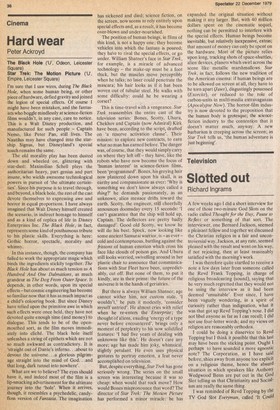Slotted out
Richard Ingrams
A few weeks ago I did a short interview for one of those two-minute God Slots on the radio called Thought for the Day, Pause to Reflect or something of that sort. The interviewer, one Bernard Jackson, seemed a pleasant fellow and together we discussed the Christian religion in a fair and uncontro.versial way. Jackson, at any rate, seemed pleased with the result and went on his way, if not rejoicing, then at least reasonably satisfied with the morning's work.
I was therefore quite startled to receive a note a few days later from someone called the Revd Frank Topping, in charge of religious broadcasting (sound), saying that he very much regretted that they would not be using the interview as it had been deemed 'unsuitable'. Ever since, I have been vaguely wondering, in a spirit of curiosity rather than indignation, what it was that got up Revd Topping's nose. I did not libel anyone as far as I can recall; I did not use four-letter words; and my views on religion are reasonably orthodox. I could be doing a disservice to Revd Topping but I think it possible that this last may have been the sticking point. Ought I perhaps to have sounded a more agnostic note? The Corporation, as I have said before, shies away from anyone too explicit on a religious theme, hence the absurd situation in which speakers like Anthony Wedgwood Benn are put out in the God Slot telling us that Christianity and Socialism are really the same thing. I was reminded of Revd Topping by the TV God Slot Everyman, called 'It Could Happen to You' (BBC1). A group of scientists, led by an Oxford zoologist, Sir Alister Hardy, had concluded from a massive survey that something like twothirds of the population would answer Yes to the Professor's question: 'Have you ever been aware of, or influenced by, a presence or power, whether you call it God or not, which is different from your everyday self?' A group of quite 'ordinary' people came on and spoke about their experiences. Having always believed, myself, that religion is a natural thing and not something that has been dreamed up on behalf of the capitalist system by clever propagandists I was not especially surprised by the findings of the survey. We are all by now used to scientists conducting vast research projects with the help of computers in order, at the end, to tell us something that we knew to be true in the first place. But the result of the survey might prod the likes of Revd Topping into realising that there is no need to tiptoe round religious themes. There is no shortage either of people ready to talk on the subject, if the Everyman programme is anything to go by.
Probably what makes Christmas TV generally depressing is the fact that it conspicuously shies away from anything to do with the events that started it all. Instead there is a non-stop parade of 'Specials' in settings that look like bad-taste Christmas cards come to life. I was sorry, on Saturday, to sde my friends the Muppets engaged in just such an extravaganza on the BBC in the company of an owl-faced, shaggy-haired American called John Denver who composes songs of dreadful sentimentality and then sings them, dancing round in piles of artificial snowflakes. For the only time in My life I switched the Muppets off.
After years of watching Robert Robinson peering rather grumpily from the chairman's desk on Call My Bluff or squatting in the Book Programme's chair, it was good to see him out on the road in Robinson's Travels (BBC1) though I could have done without the explicit shot of the Robinsonian bum being injected with a huge hypodermic. India, whither Robinson headed, is a notorious graveyard of travel writers and TV men. The temptation to indulge in John Pilger-like bouts of souped-up indignation over the terrible Poverty which is on open display wherever You go is fairly considerable. Robinson eschewed the Pilger role and, despite his regrettable tendency to aphorise, succeeded in producing a very entertaining programme. The secret of the good travelogue is not to generalise but to fasten on individual scenes and characters. Part of the charm of India nowadays, in addition to the humorous gurus, is that it is the last home of the Old-fashioned English gent. Calcutta is renowned for its dreadful slums but it also has an impressive racecourse where rich Indians With moustaches go through the motions with almost greater assurance than their Cheltenham equivalents. The photography wasof a high quality.



























































 Previous page
Previous page